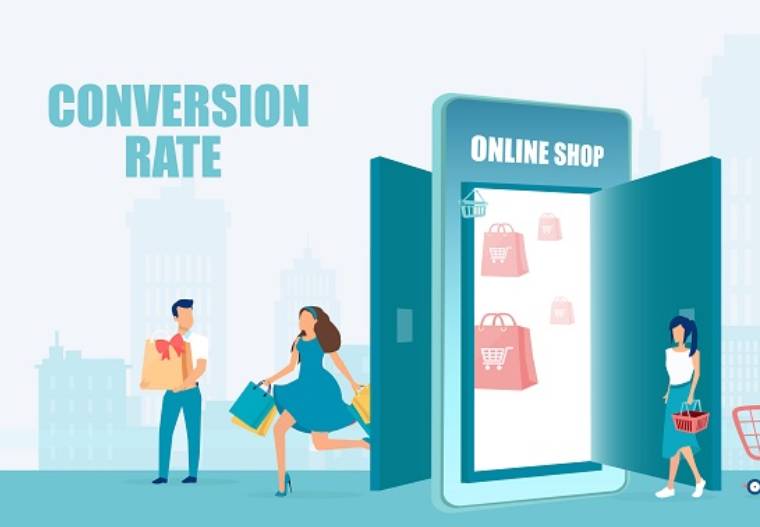Digital Marketing Services
Learn More About Us

Since the Internet's widespread adaptation, eCommerce has been a flourishing industry. In fact, 69% of Americans now shop online, while 85.9% of millennials make purchases online.
Consumer behavior undeniably shapes websites and online businesses. However, online traffic is highly inconsistent in today's society. The likelihood of visitors returning and performing the desired action is relatively low if you can't convince them to enter your conversion funnelThe stages a customer goes through from initial awareness to final conversion. on the first attempt.
This is nothing more than a missed chance for your company. Running successful campaigns for conversion rateThe percentage of visitors who complete a desired action, such as making a purchase or filling out a... optimization is the best approach to increasing your chances of gaining visitors and obtaining more conversions.
A successful conversionThe completion of a desired action by a referred user, such as making a purchase or filling out a fo... rate optimization campaignA set of ad groups sharing a budget, targeting options, and other settings. will help you save a lot of time, money, and effort while also discovering previously untried growth strategies. In other words, conversion rate optimization provides insights into customer behavior and offers advice on improving your user experience (UX)The overall experience a user has when interacting with a website or application, including usabilit... to achieve your objectives.
Conversion rate optimization (CRO)The systematic process of increasing the percentage of website visitors who take a desired action, s... is constantly learning and improving from a strategic perspective. Read the article below to learn how conversion rate optimization works.
Before figuring out how conversion rate optimization works, let us first dive into the idea of what CRO really is.
Conversion rate optimization is the practice of maximizing the percentage of website visitors or mobile eCommerce app users who perform a desired action. Purchase a product, clicking 'add to cart,' sign up for a service, fill out a form, or clicking on a link are all desired activities. The focus of traditional CRO models is on conversion rates, averages, and benchmarks.
The way conversion rate optimization works involves a comprehensive process that sprawls across many phases. An effective CRO campaign uses in-depth and processed data to analyze results, run several tests, adjust content to make it more relevant to visitors, and obtain necessary conversions.
By extracting more value from the visitors and users you already have, conversion rate optimization enables you to reduce your customer acquisition expenditures. You can boost revenue per visitor, attract more clients, and expand your business by optimizing your conversion rate.
For instance, if a landing pageThe web page a user is directed to after clicking on an affiliate link, optimized for conversions. has a 10% conversion rate and gets 2000 visitors each month, it will result in 200 conversions per month. Optimizing various page elements may raise the conversion rate to 15%, increasing the number of conversions by 50% to 300 per month.
Keep in mind that there is always room for improvement when it comes to increasing conversions. Top organizations and companies are constantly developing and improving their sites and applications to provide a better user experience for their consumers and grow conversions.
Throughout the journey of a CRO campaign, an individual encounters six primary elements that can be optimized.
Its landing page design is the primary factor determining a website's usability and success. Basically, a site's more aesthetically designed, the more traction it will receive. Different design elements such as unique typography, color choice, effective use of space, and the overall layout of the site are important considerations.
A well-designed and aesthetically pleasing website can increase website traffic, but words have the power to captivate readers and turn them into potential customers. It can make a difference between visitors staying on your website and performing the necessary activities and visitors leaving your site without taking any action. Writing pertinent and compelling content that highlights the product's persuasiveness is crucial.
An explicit request or call for customers to perform the intended action is what a call-to-action (CTA) is. This action could be anything, but make sure that your CTA is compelling. The stronger and crispier the CTA, the more leads it can generate.
The layout of your website should be designed to make it simple for your customers to navigate. Site structure is basically a graph that shows how various pages on your website interact with each other. One must ensure that each page of your website flawlessly connects and interacts with the other pages.
Most businesses depend heavily on forms, especially if they're a part of their sales funneling strategy. Optimizing these critical client touchpoints can significantly boost conversion rates. The key aspect in managing forms is to continually maintain a balance between leadA potential customer referred by an affiliate who has shown interest in the product or service but h... quality and lead volume to maximize return on investment.
Page speed, also known as page load timeThe time it takes for a webpage to fully load, affecting user experience and conversion rates., significantly impacts your site's overall performance. In fact, it directly affects the user's experience, the site's conversion rate, and its search engine ranking. For instance, a load time delay of even one second can reduce your conversions by 7%.
If you own a small business and are looking to up your marketing campaign, check out this Bliss Drive article on some digital marketing ideas for small businesses.
